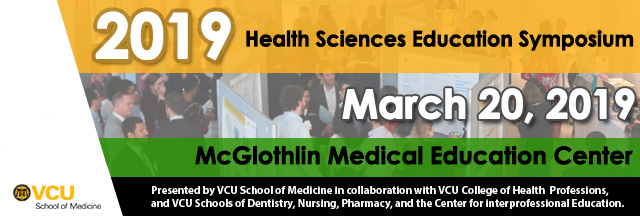Health Sciences Education Symposium
Presentation Title
Presentation Format
Poster
Type of Activity
Research
Original Presentation Date
2017
Date of Submission
May 2017
Abstract/Short Description
Background: There is substantial research on the effectiveness of ambulatory medical preceptors’ teaching skills, but less is known about the student perspective: What do students say contributes most to effective learning in a busy clinical practice?
Methods: As part of a formative mid-point assessment during the third-year clerkship in family medicine, students were asked to respond to the following open-ended reflective prompt: 'My preceptor contributed to my learning by...' A qualitative assessment of student responses was conducted to identify themes describing effective learning in the ambulatory setting. Responses for all clerkship students from the years 2012-2014 were examined (N=314).
Results: The most common characteristic of effective learning identified by respondents was Autonomy in Practice. Other prominent themes included Stimulating Critical Thinking and Feedback.
Purpose/Research Question
What do medical students believe constitutes effective learning in the ambulatory clinical setting?
Objectives
What do medical students believe constitutes effective learning in the ambulatory clinical setting?
References
1. Christner JG, Dallaghan GB, Briscoe G, et al. The Community Preceptor Crisis: Recruiting and Retaining Community-Based Faculty to Teach Medical Students—A Shared Perspective From the Alliance for Clinical Education. Teach Learn Med. 2016;28:329-336.
2. Carney PA, Eliassen MS, Pipas CF, Genereaux SH, Nierenberg DW. Ambulatory care education: how do academic medical centers, affiliated residency teaching sites, and community-based practices compare? Academic Medicine. 2004;79:69-77.
3. Steven K, Wenger E, Boshuizen H, Scherpbier A, Dornan T. How clerkship students learn from real patients in practice settings. Academic Medicine. 2014;89:469-476.
4. Denton GD, Griffin R, Cazabon P, Monks SR, Deichmann R. Recruiting primary care physicians to teach medical students in the ambulatory setting: a model of protected time, allocated money, and faculty development. Acad Med. 2015;90:1532-1535.
5. Denton GD, Lo MC, Brandenburg S, et al. Solutions to common problems in training learners in general internal medicine ambulatory settings. Am J Med. 2015;128:1152-1157.
6. Huggett KN, Warrier R, Maio A. Early learner perceptions of the attributes of effective preceptors. Advances in health sciences education. 2008;13:649-658.
7. Elnicki DM, Kolarik R, Bardella I. Third‐Year Medical Students' Perceptions of Effective Teaching Behaviors in a Multidisciplinary Ambulatory Clerkship. Academic Medicine. 2003;78:815-819.
8. Karani R, Fromme HB, Cayea D, Muller D, Schwartz A, Harris IB. How medical students learn from residents in the workplace: a qualitative study. Acad Med. 2014;89:490-496.
9. Schultz KW, Kirby J, Delva D, et al. Medical Students' and Residents' preferred site characteristics and preceptor behaviours for learning in the ambulatory setting: a cross-sectional survey. BMC Medical Education. 2004;4:12.
10. Telio S, Ajjawi R, Regehr G. The 'educational alliance' as a framework for reconceptualizing feedback in medical education. Acad Med. 2015;90:609-614.
11. Johnson CE, Keating JL, Boud DJ, et al. Identifying educator behaviours for high quality verbal feedback in health professions education: literature review and expert refinement. BMC medical education. 2016;16:96.
12. Strauss A. The discovery of grounded theory: Strategies for qualitative research. . 1967.
13. Van der Zwet J, Hanssen V, Zwietering P, et al. Workplace learning in general practice: supervision, patient mix and independence emerge from the black box once again. Med Teach. 2010;32:e294-e299.
14. Dornan T, Tan N, Boshuizen H, et al. How and what do medical students learn in clerkships? Experience based learning (ExBL). Advances in Health Sciences Education. 2014;19:721-749.
15. Branch Jr WT, Paranjape A. Feedback and reflection: teaching methods for clinical settings. Academic Medicine. 2002;77:1185-1188.
16. Corbin J, Strauss A. Basics of Qualitative Research: Techniques and Procedures for Developing Grounded Theory. Sage publications; 2014.
17. Saldaña J. The Coding Manual for Qualitative Researchers. Sage; 2015.
18. Neher JO, Gordon KC, Meyer B, Stevens N. A five-step 'microskills' model of clinical teaching. J Am Board Fam Pract. 1992;5:419-424.
19. Hoffman M, Cohen-Osher M. The One Minute Learner: Evaluation of a New Tool to Promote Discussion of Medical Student Goals and Expectations in Clinical Learning Environments. Fam Med. 2016;48:222-225.
20. Wolpaw TM, Wolpaw DR, Papp KK. SNAPPS: a learner-centered model for outpatient education. Academic Medicine. 2003;78:893-898.
21. Ramani S, Mann K, Taylor D, Thampy H. Residents as teachers: Near peer learning in clinical work settings: AMEE Guide No. 106. Med Teach. 2016:1-14.
22. Lo L, Regehr G. Medical Students' Understanding of Directed Questioning by Their Clinical Preceptors. Teach Learn Med. 2016:1-8.
23. Reifler DR. The Pedagogy of Pimping: Educational Rigor or Mistreatment? JAMA. 2015;314:2355-2356.
24. McCarthy CP, McEvoy JW. Pimping in Medical Education: Lacking Evidence and Under Threat. JAMA. 2015;314:2347-2348.
25. Stoddard HA, O’Dell DV. Would Socrates have actually used the “Socratic Method” for clinical teaching? Journal of general internal medicine. 2016;31:1092-1096.
26. Kost A, Chen FM. Socrates was not a pimp: changing the paradigm of questioning in medical education. Acad Med. 2015;90:20-24.
27. Matson C, Stephens M, Steiner B, Kozakowski SM. Electronic health records: how will students learn if they can't practice? Ann Fam Med. 2014;12:582-583.
Rights
© The Author(s)
Is Part Of
VCU Medical Education Symposium




First Author Information
Melissa K. Bradner, MD, MSHA, Virginia Commonwealth University, Department of Family Medicine and Population Health